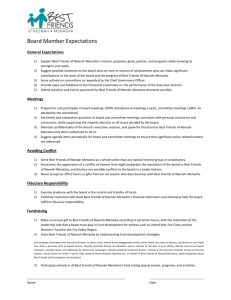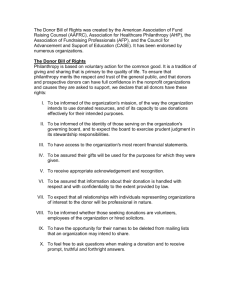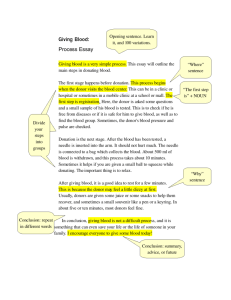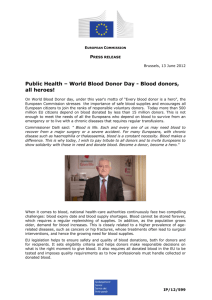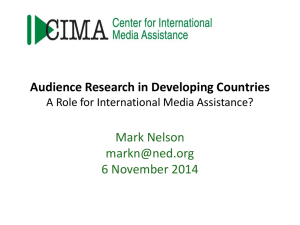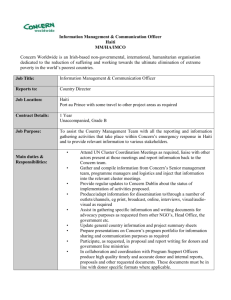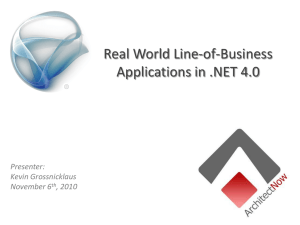BLOOD DONAR DATABASE SYSTEM
advertisement
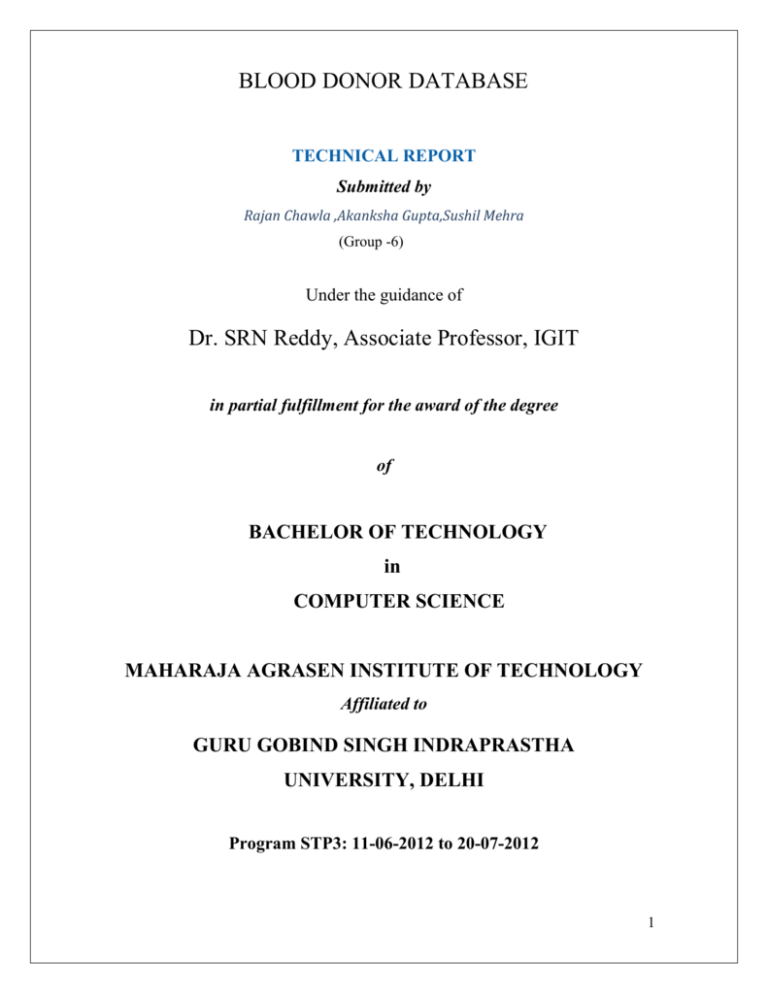
BLOOD DONOR DATABASE TECHNICAL REPORT Submitted by Rajan Chawla ,Akanksha Gupta,Sushil Mehra (Group -6) Under the guidance of Dr. SRN Reddy, Associate Professor, IGIT in partial fulfillment for the award of the degree of BACHELOR OF TECHNOLOGY in COMPUTER SCIENCE MAHARAJA AGRASEN INSTITUTE OF TECHNOLOGY Affiliated to GURU GOBIND SINGH INDRAPRASTHA UNIVERSITY, DELHI Program STP3: 11-06-2012 to 20-07-2012 1 INDEX The Complete Paper 3 Publication of Apps 12 Contributions 14 Contact Details 15 2 BLOOD DONAR DATABASE SYSTEM Sushil Mehra, Akanksha Gupta, Rajan Chawla Maharaja Agrasen Institute of technology, Rohini Sector 22 CSE Department sushilmehra@live.com akanksha.gupta1693@gmail.com rajanchawla3@gmail.com 1. Abstract The application Blood donor database groups together all the donors under one group. No such system has been developed till now. The application aims at bringing the donors under one roof so that they can donate blood easily. Currently the donors have to look for the blood donation camps that cause wastage of time. This application will help find blood donors easily. Blood donors can register to know about the blood banks and blood donation camps nearest to them. Organizations like hospitals and blood banks or any person in need of blood can also register and find donors in their specified area. It is software developed for windows phone where blood banks and hospitals can look for donors in their nearby area who will be available in quick time. Keywords Platform, Tool, Mobile Operating System, Smartphone, Iphone, Android, Windows Mobile, Symbian, Blackberry. 2. Introduction Blood Donor Database is developed for a windows phone where blood banks and hospitals can look for donors in their nearby area who will be available in quick time. Similarly, blood donors can also look for blood banks and blood donation camps in an area nearest to them to donate blood. This application will make the job easier for blood donors and blood receivers. This work will help all the blood donors and receivers to find each other easily and accomplish their cause. The user can simply register by entering some personal details such as name, e-mail, organization name, address and phone number. An account for the 3 user will be created and he/she can login to get the required information. The most useful feature of this application is that the donor or the receiver can find each other in the area specified by them. The private information of the donor will be kept confidential and only registered organizations and authorized personnel can access it, only if the donor gives permission to access it. 3. Platform Selection As mentioned in Rapidsoft Systems’ Mobile Software Development and Mobile Porting – Technology and Cost Issues paper, one of the most important choices to be made by the developer is at the beginning of the development process that is on which mobile software platforms should the application run. Some platforms are given below. BREW BREW is a C++-based smart client platform for handsets based on Qualcomm's CDMA chips. Its main attraction is that the platform integrates very well with the operator's services and enjoys automatic support for content downloading and billing. BREW is very popular among CDMA network operators in the United States. BREW is a good platform to start on, although its reach is limited. The number of CDMA network subscribers is only one-fifth of GSM network subscribers worldwide. In addition, the C++ programming language is difficult for many developers to master. J2ME J2ME is by far the most popular application development platform for mobile devices. It is primarily available on GSM handsets and is supported by all major GSM manufacturers, including Nokia, Motorola, Samsung, and Sony-Ericsson. In fact, J2ME is even supported on Nokia's CDMA devices and Motorola's Windows Mobile devices. With automatic memory management and a rich set of easy-to-use APIs, J2ME is designed to boost developer productivity. On the other hand, the large market share and diverse device support for J2ME also present the biggest technical challenge for J2ME developers -- the problem of porting an application to a variety of devices. Android 4 Android is a software platform and operating system for mobile devices, based on the Linux kernel, developed by Google and later the Open Handset Alliance. It allows developers to write managed code in the Java language, controlling the device via Google-developed Java libraries. Applications written in C and other languages can be compiled to ARM native code and run, but this development path isn't officially supported by Google. iPhone iPhone is a very popular handset with developers and users alike. With millions of users, iPhone is a popular device for mobile development. The iPhone is an internet-connected multimedia smartphone designed and marketed by Apple Inc. Its minimal hardware interface lacks a physical keyboard, so a virtual keyboard is rendered on the multi-touch screen instead. The iPhone functions as a camera phone(including text messaging and visual voicemail), a portable media player(equivalent to an iPod), and an Internet client (with email, web browsing, and local Wi-Fi connectivity). The first-generation phone hardware was quad-band GSM with EDGE; the second generation added UMTS with HSDPA. iPhone’s iOS is the operating system that runs on the iPhone (both models) and the iPod Touch. It is based on a variant of the same basic Mach kernel that is found in Mac OS X. iPhone OS includes the software component "Core Animation" from Mac OS X v10.5 which, together with the PowerVR MBX 3D hardware, is responsible for the interface's smooth animations. The operating system takes up less than half a GB of the device's total storage (4, 8, or 16 GB). It is capable of supporting bundled and future applications from Apple, as well as from third-party developers. Software applications cannot be copied directly from Mac OS X but must be written and compiled specifically for iPhone OS. Blackberry RIM provides a proprietary multi-tasking operating system (OS) for the BlackBerry, which makes heavy use of the device's specialized input devices, particularly the scroll wheel (1999–2006) or more recently the trackball (September 12 2006–Present). The OS provides support for Java MIDP 1.0 and WAP 1.2. Previous versions allowed wireless synchronization with Microsoft Exchange Server's e-mail and calendar, as well as with 5 Lotus Domino's e-mail. The current OS 4 provides a subset of MIDP 2.0, and allows complete wireless activation and synchronization with Exchange's e-mail, calendar, tasks, notes and contacts, and adds support for Novell GroupWise and Lotus Notes. Third-party developers can write software using these APIs, proprietary BlackBerry APIs as well, but any application that makes use of certain restricted functionality must be digitally signed so that it can be associated to a developer account at RIM. This signing procedure guarantees the authorship of an application, but does not guarantee the quality or security of the code. Windows Mobile Windows Mobile is a compact operating system combined with a suite of basic applications for mobile devices based on the Microsoft Win32 API. Devices that run Windows Mobile include Pocket PCs, Smartphones, Portable Media Centers, and on-board computers for certain automobiles. It is designed to be somewhat similar to desktop versions of Windows, feature-wise and aesthetically. Additionally, third-party software development is available for Windows Mobile. Originally appearing as the Pocket PC 2000 operating system, Windows Mobile has been updated several times, with the current version being Windows Mobile 7.1 and a future 7.5 and 8 release is planned. We have used Windows 7.1 platform for our Blood Donor Database application. 4. Windows Phone 7 Architecture Windows Phone 7 consists of four layers : 1. .NET compact framework 2. Common services 3. Silverlight/XNA applications 4. Applications Layer 1: .Net compact framework consists of Base types, XML, Serialization, WCF, LINQ and Isolated storage Layer 2: Common services consists of sensor’s API, location, XNA media’s API, XNA’s sound API, networking and live services 6 Layer 3: Silverlight applications consists of Applications, Rendering animations and Silverlight controls XNA: Game loops, content pipeline, 2D and 3D graphics Layer 4: Applications consists of Silverlight and XNA applications We used Windows Phone platform for our application because of the following reasons. 1. Easy to use as compared to other platforms 2. Design and coding view both are available 3. Contains necessary graphical user elements required for the application 4. A developer can easily design and make changes in the application 5. Tool Selection Software development tool is a software package which is used to develop the software part of the system i.e. the software code. The programming language used for the application is Visual C# in IDE Visual Studio 2010 Express for Windows phone. User writes his code in Visual C# language on the editor and then builds the solution in the windows phone emulator. The Visual Studio 2010 Express for windows phone and the windows phone emulator are used to create and build application. 5.1.1 MICROSOFT VISUAL STUDIO 2010 EXPRESS IDE As stated by Wikipedia, Visual Studio Express is an easy-to-use, free, lightweight, Integrated Development Environment (IDE) designed for building console-based applications, class libraries, Windows Forms and Windows Presentation Foundation applications. It can be used to create applications and games (when combined with the XNA Game Studio) for Windows, Xbox 360 and Zune. 5.1.2 EXPRESSION BLEND Microsoft Expression Blend is a user interface design tool developed and sold by Microsoft for creating graphical interfaces for phone, web and desktop based applications that blend the features of these types of applications. It is an interactive, WYSIWYG front-end for designing XAML-based interfaces for Windows Phone Foundation and 7 Silverlight applications. It is one of the applications in the Microsoft Expression Studio suite. It has an interactive drag and drop environment. 5.1.3 MICROSOFT EXPRESSION DESIGN Microsoft Expression Design is Microsoft's commercial professional illustration vector and raster graphic design tool for web images. It is part of the Microsoft Expression Studio suite. Expression Design is more oriented towards editing XAML and web graphics rather than print graphics (like Photoshop and Illustrator). 5.1.4 WINDOWS PHONE EMULATOR Emulators provide an inexpensive way to test applications on mobile phones to which developers may not have physical access. As stated by Microsoft, Windows Phone Emulator is a desktop application that emulates a Windows Phone 7 or a Windows Phone 7.1 device. It provides a virtualized environment in which you can develop, debug, and test Windows Phone applications. It also provides an isolated environment for early application prototypes. By using the emulator, you can proceed through the common application development scenarios without a physical device. This can reduce the cost of developing applications for Windows Phone. Windows Phone Emulator is designed to provide comparable performance to an actual device, and to meet the peripheral specifications typically required for application development. You interact with Windows Phone Emulator in the same way that you would interact with a Windows Phone device, except that rather than touch the screen, you use the mouse pointer to select on-screen options. Alternatively, you can use your computer keyboard to provide input to Windows Phone Emulator. 8 6. Project architecture Start Initialize Main page Enter user details to signup Member Donate Select from the options: Donate, need and Register Need Register Press Submit/ member Register by entering username, password and phone no. submit Location entered by the user donor Check For Donor/ Blood bank Bing maps will show location Blood bank List of all donors Member Do not match Enter details to login into account Send message to donor Check if entered details correct Show error message match Open member account Exit Exit Exit Exit 9 7. Future work There is a scope of further improvement of the system. The system can be expanded with the following ideas: It is recommended to develop a system which is not limited to Delhi only but can be used in other areas. We aim at including as many blood banks as possible and also as many donors as possible. At present, the blood bank can only see the list of donors, but in future we will also include features by which blood banks can call, sms as well as send an e-mail to the donor. 8. Conclusion The conclusion is that we have a better system which will help in better interaction between the blood donors and the blood banks. This application has a wide usage and will encourage donors to donate blood. Following are the contributions of this system towards this cause: The user can read information about blood and the basic requirements for a donor. The donor can find blood banks in his nearest area via maps or call a blood bank in his area by the numbers provided in the application. The blood banks can see a list of donors of a particular blood group and can contact them to donate blood. The system is scalable and allows any number of different devices to be added with no major changes in its core. 10 9. References [1] www.expressionblend.com to find information about the tool expression blend [2] www.silverlight.codeplex.com to get information about Silverlight [3] www.msdn.com is the Microsoft website which was referred to understand about windows programming and for better understanding of application development tools [4] e-book Essential Windows Phone 7.5, application development with Silverlight by Shaun Wildermuth [5] expression blend and visual studio 2010 express for windows phone tutorial from www.youtube.com [6] www.google .com which provided extensive information for the project [7] ebook Windows Phone 7 Recipe by Fabia Claudio Ferrarchiatti and Emanuele Garofalo [8] Microsoft Silverlight 4 by Laurence Moroney [9] Windows Phone 7.5 – data cook book by Ramesh Thalli [10] Rapidsoft Systems’ paper on Mobile Software Development and Mobile Porting – Technology and Cost Issues [11] Kanobe Fredrick project report on Web-based blood donor management information system for Red Cross Society, Uganda to School of Graduate Studies 11 Applications Develped Screenshots 12 Blood Donor Database Program STP3: 11-06-2012 to 20-07-2012 Year 2012 Note : The following application is still under developing stage 13 Contributions Publisher GUID Publisher name d38576e8-3525-4ca5-b3a2-2cb14563adb6 S.R.C Application Name 1. HD Movies http://www.windowsphone.com/en-us/store/app/hd_movie/d12faafb-43df-41deb3b0-ab8cd0ba897f 2. Paint http://www.windowsphone.com/en-us/store/app/paint/1a89eddf-a72e-4864-a46304851859dba0 3. Learn PHP http://www.windowsphone.com/en-us/store/app/learn-php/ba9d7c35-053b-4678ac6c-b653c014f0a6 4. Free Calling http://www.windowsphone.com/en-us/store/app/free-calling/17d4a945-c07f-4a6cb260-8223310165f5 5. Html Cheat Code http://www.windowsphone.com/enus/store/app/html-cheat-code/06970a06-79e34ac3-a473-b2c108f0043d 6. Beauty_tips http://www.windowsphone.com/en-us/store/app/beauty_tips/6f3cfc06-1c13-4a968d74-f337c5215ecf 14 Contact Details Rajan Chawla Phone Number: 9999332888 Email: rajanchawla3@gmail.com Akanksha Gupta Phone Number: 8860406554 Email: akanksha.gupta1693@gmail.com Sushil Mehra Phone Number: 9811201242 Email: sushilmehra@live.com 15
